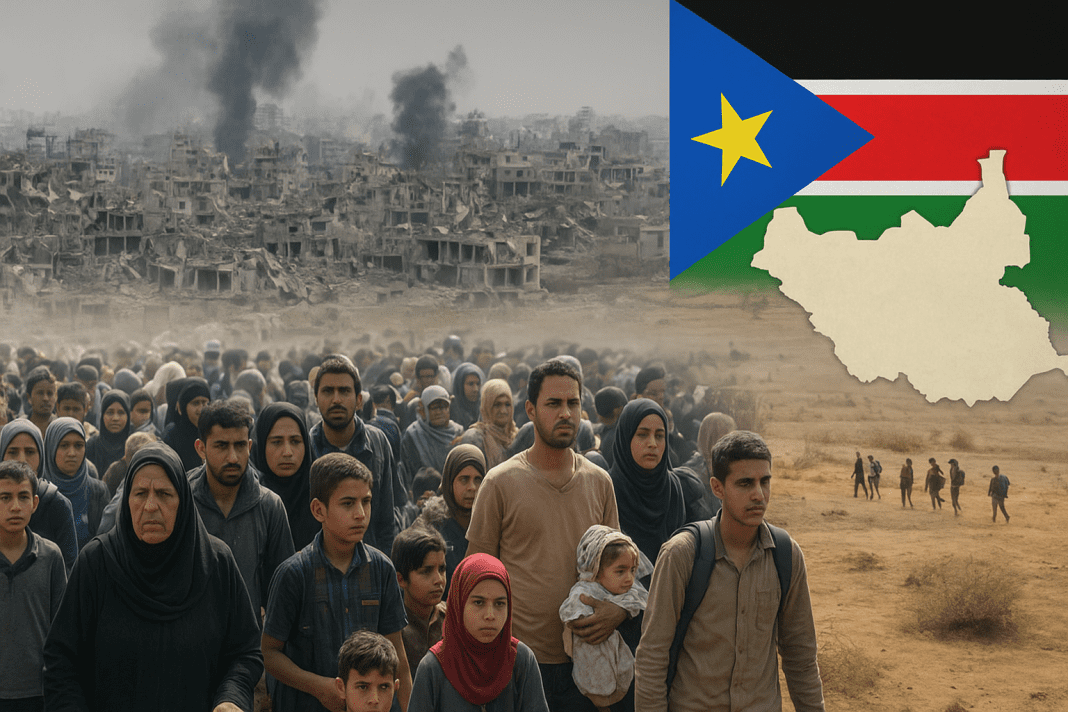Regarding the potential relocation of Palestinians from the Gaza Strip to the East African country, Israel is in talks with South Sudan. The negotiations are a part of Israel’s larger effort to ease mass exodus out of Gaza, which has been devastated by months of fighting.
Talks on a Possible Relocation Plan
Although it’s unknown how far along the negotiations are, several people with knowledge of the situation have verified that these talks are happening. If implemented, the plan would mean transferring people from a war-ravaged and famine-threatened territory to another nation facing its own severe challenges.
The idea of relocation has been linked to proposals presented to several African nations in recent years. South Sudan has emerged as one of the potential destinations due to its political and diplomatic interests in building closer ties with Israel. Reports suggest that Israel could provide financial assistance for the creation of temporary camps in South Sudan to house the relocated population.
Gaza for Sale? U.S. May Trade Frozen Libyan Funds for Relocation of Over 1 Million Palestinians
Concerns over Relocation Raised by Neighboring Countries and Rights Groups
The proposal has raised significant concerns internationally. Many countries and human rights organizations have rejected the idea, warning that it could be seen as forced displacement, which would violate international laws. Critics argue that moving Palestinians from Gaza could amount to a permanent removal from their homeland.
Neighboring Egypt has expressed strong opposition to any plan that involves moving Palestinians out of Gaza. Egypt shares a border with the territory and fears that such a move could trigger an influx of refugees into its own land. According to reports, Egyptian authorities have urged South Sudan to reject the plan.
There are logistical and humanitarian issues in addition to Egypt’s worries. A weak peace process, political instability, and food shortages make South Sudan one of the most unstable nations in the world. The country still depends heavily on international aid to feed its population.
From War Zone to Real Estate: Trump’s Gaza Dream Unfolds
South Sudan’s Position and Current Conditions
South Sudan gained independence in 2011 after a long and violent struggle, but it has since faced years of internal conflict. A civil war that broke out soon after independence killed hundreds of thousands of people and caused widespread famine. Although leaders signed a peace deal several years ago, tensions still run high, and violence continues in some areas.
The country depends heavily on oil for its economy, but corruption, weak infrastructure, and ongoing political instability have blocked its full recovery. Large portions of the population live in poverty, and urgent humanitarian needs persist.
Many people in South Sudan worry about how they might receive Palestinians. Historical tensions between communities in South Sudan and the Arab world could cause mistrust or hostility toward new arrivals from Gaza. Local civil society groups have warned that authorities must handle any relocation plan with extreme care to avoid social tensions.
Some reports suggest that Israel may offer financial incentives to South Sudan to accept the relocation, with payments potentially covering the construction and maintenance of temporary housing. However, there is no official confirmation on the specifics of such arrangements.
🪦 Grave warfare? Israeli troops find Gaza missiles buried in Daraj Tuffah Cemetery
Talks continue amid opposition to permanent relocation
The United States has not confirmed any direct involvement in the talks but is reportedly aware of the discussions. South Sudan has been seeking to strengthen its diplomatic ties with powerful allies to secure financial and political support.
Many Palestinians view leaving Gaza as a way to escape the ongoing conflict and food shortage. However, they widely oppose the concept of permanent relocation because they fear authorities will not permit those who leave to return.
Officials have not formally declared an agreement, and negotiations are still underway. They have not scheduled a date for a possible Israeli delegation to travel to South Sudan, and both the South Sudanese government and Israel have avoided publicly commenting on the specifics.

